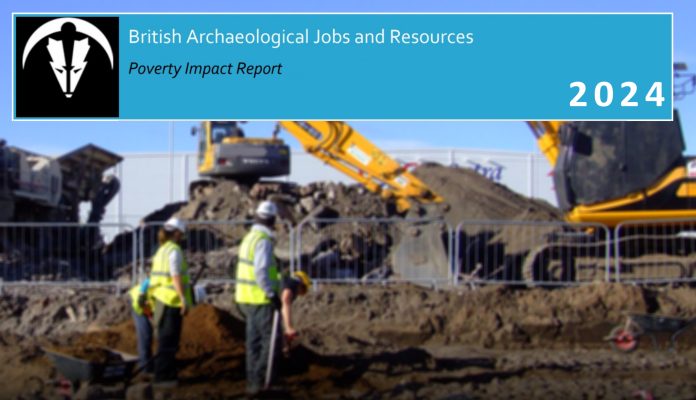This 2024 Poverty Impact Report is based on the responses of 645 individuals in UK archaeology. The statistics that have been collected, analysed and collated by Lu Stanton-Greenwood. The concept was originally proposed by Liz Tideswell, who along with David Connolly and Gwilym Williams offered professional support and opinion.
Without all of us, and those who responded to this survey, there would be no report. Again – thank you all.
Main PIR Report 2024 (pdf)
Survey Comments (It is a difficult read ) (pdf)
With the first PIR in 2022 we needed to know the truth, and now we do; British Archaeology was depriving itself of talent and a skilled workforce that took years to build, by the simple expedient of providing little vestige of hope to make enough money to break even, and not a hope of saving anything for the future. We heard the excuse that wages had to be at this level, because the ‘margins are too slim‘, that ‘other companies will undercut’, or ‘company benefits more than make up for lower rates of pay‘.
Benefits, can’t pay for food with 50% off gym membership, and you can’t turn on heating this winter with a Bike to Work scheme – and how many field staff can realistically Bike to work?
There is hope though, as these are some of the recent base rate G2 post salaries. Oxford Archaeology: £26,570, Cotswold Archaeology: £26,507, MOLA c.£26,925 (inc Adjusted Regional rate) Archaeology South East: £29,169 (inc London weight), PCA : £25,989, Archaeology Wales: £25,975
I singled them out, as they obviously saw how the crushing cost of living was impacting their staff and responded.
A final recap of the summarised data suggests that although individual archaeologists are being pushed past the poverty line, there are signs of potential, as in 2022 just over a 35% felt confident that they could continue in archaeology, while this has risen to 46% in this 2024 survey. This is due to a concerted effort by many employers to help staff as best they can within a challenging time.
The loss of the CIfA minima – with only the BAJR minima remaining, and greater instability in the general economy with rising costs of fuel, food and heating, requires an appropriate level of salary, contract stability and support in both mental health and flexible working.
We realise that the new pressures of the National Insurance costs will impact employers negatively, however, is it not time to pass the costs on to clients rather than depress wages?
This and other key reports have acted as the catalyst for us to work together to make a profession that is worth the time, effort and money that each person has invested into becoming an archaeologist. Do we stop now? Do we stall progress? Do we find another excuse why something can’t be done? What a waste of time, effort and potential that would be. There is no one solution – there is no one organisation that can solve this situation, thus it is up to each of us to use our unique resources and work together towards a shared goal. When you again read the comments, you see a workforce crying out for a sustainable future – they deserve better.
RESOURCES:
- Main PIR Report 2024 (pdf)
- Survey questions (pdf)
- Raw Data – Identifying details removed (xlsx)
- Survey Comments (It is a difficult read ) (pdf)
- the 2022 Report is available here
Archaeologists in Financial Crisis – BAJR Survey 2022 | BAJR
Selected Comments
“ I am no longer able to add to my savings, so I’m sure things are significantly worse for younger colleagues.”
“ Low pay, long hours (including unpaid drive time over 2.5 hours a day), difficult working conditions, and stress are just some of the factors that make this a horrible profession to work in.”
“ Archaeology is so badly paid I imagine the vast majority of people including myself will simply be priced out of the profession. “
“ Forced into poverty because of the surge in food prices “
“ I find I’m coming to the bottom of my bank account during the month and sometimes using my credit card to pay for food. “
“ My company gave us a generous pay rise in April last year, which made life easier but I am noticing less and less money in my account at the end of each month “
The continuing rise in the cost of living is affecting everyone, so CIfA has also gathered together useful information and links on some of the practical support CIfA can offer.

